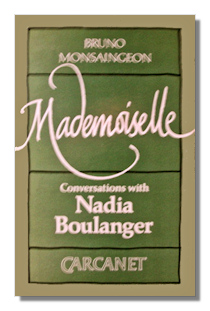
The Internet's Premier Classical Music Source
Related Links
-
Introduction
Acoustics
Ballet
Biographies
Chamber Music
Composers & Composition
Conducting
Criticism & Commentary
Discographies & CD Guides
Fiction
History
Humor
Illustrations & Photos
Instrumental
Lieder
Music Appreciation
Music Education
Music Industry
Music and the Mind
Opera
Orchestration
Reference Works
Scores
Thematic Indices
Theory & Analysis
Vocal Technique
Search Amazon
Recommended Links
Site News
 Book Review
Book Review
Mademoiselle

Conversations with Nadia Boulanger
Bruno Monsaingeon. Robyn Marsack, trans.
Manchester: Carcanet Press. 1985. 208 pages.
ISBN-10: 0856356034
ISBN-13: 978-0856356032
Summary for the Busy Executive: Music lessons, life lessons.
Nadia Boulanger disliked talking about herself so much that she often deliberately fed interviewers balderdash, especially when she felt they hadn't done their homework. Monsaingeon, also a violinist and a documentary filmmaker (including a film about Boulanger), turned out a three-volume bio of Glenn Gould (Le dernier Puritain), which at least shows dedication to his subjects. He seems to have brushed up, and he does correct Boulanger gently on one or two things. So I have no idea how many fairy tales she told him, but it certainly doesn't sound like many. On the other hand, Boulanger submitted to these interviews just before her death. Monsaingeon issues the disclaimer that these interviews are really reconstructions. He admits to fabricating some of the things he has Boulanger say, due to the fact that she died before he could follow up and to his wanting to incorporate some of his questions into her speech for better flow. He doesn't cite specific instances, but I must admit that it didn't bother me, mainly because I'm no scholar and Monsaingeon doesn't let the seams show.
However, the letter of this quasi-biography matters less than its spirit. If you want a good bio, I'd recommend Lèonie Rosenstiel's Nadia Boulanger: A Life in Music. However, Boulanger, even into advanced age, had so much wisdom in her that she couldn't help but say something valuable. Her opinions of various painters, writers, and composers and musicians she has known (many of them her students) – her Rolodex, if she had one, would have contained many of the brightest names in 20th-century art – are perceptive and surprising. She set great store by what she called attentiveness – gleaning all she could from a particular moment and mulling it over afterward, continually and for years.
She considered her own achievement a modest one. She was no Stravinsky (a good friend) and indeed gave up composition herself after the death of her sister Lilli, whom she considered the more genuine talent. She claimed no interest in reviving her own works, which she considered well-made but not worth hearing. She claimed to have taught nothing different than what she learned at the Conservatoire. She insisted that her students, even the absurdly talented ones like Igor Markevitch and Idil Biret, master the academic basics – solfège, sight-reading, academic counterpoint. No talent without foundation. Foundation without talent is harmless. Talent without foundation is mute or lame, ultimately useless. Two rare things shone very strongly in her, however. First, her point of view linked works in various centuries – medieval to Modern – to one another. She saw connections no one else did until she pointed them out. Second, for her, art, philosophy, and religion came together, although she never confused one for another. She was a practicing Catholic and simultaneously a clear-eyed French intellectual with a distaste, rare among the tribe, for B.S. For her, thinking well became an ethical matter. Her students and her friends were all touched by this trait. It attracted them to her. I can't begin to tell you all I've learned from this book, even at my advanced age, and I never met her in person. She must have been dynamite up close.
The book also contains an introduction by Elliott Carter, a Boulanger student, as well as reminiscences from Leonard Bernstein (a friend, not a pupil), Lennox Berkeley (student), singers Doda Conrad and Hugues Cuenod (both members of her elite vocal ensemble), Yehudi Menuhin, Jeremy Menuhin (student), Murray Perahia (long-distance friend), Paul Valéry, and unfortunately Pierre Schaeffer. Schaeffer contributes a self-indulgent something-or-other (B.S. = profundity) completely at odds with the clarity of a truly wise figure like Valéry or Boulanger. If you've got something valuable to say, you don't need to hide behind a curtain.
Copyright © 2011 by Steve Schwartz.


















